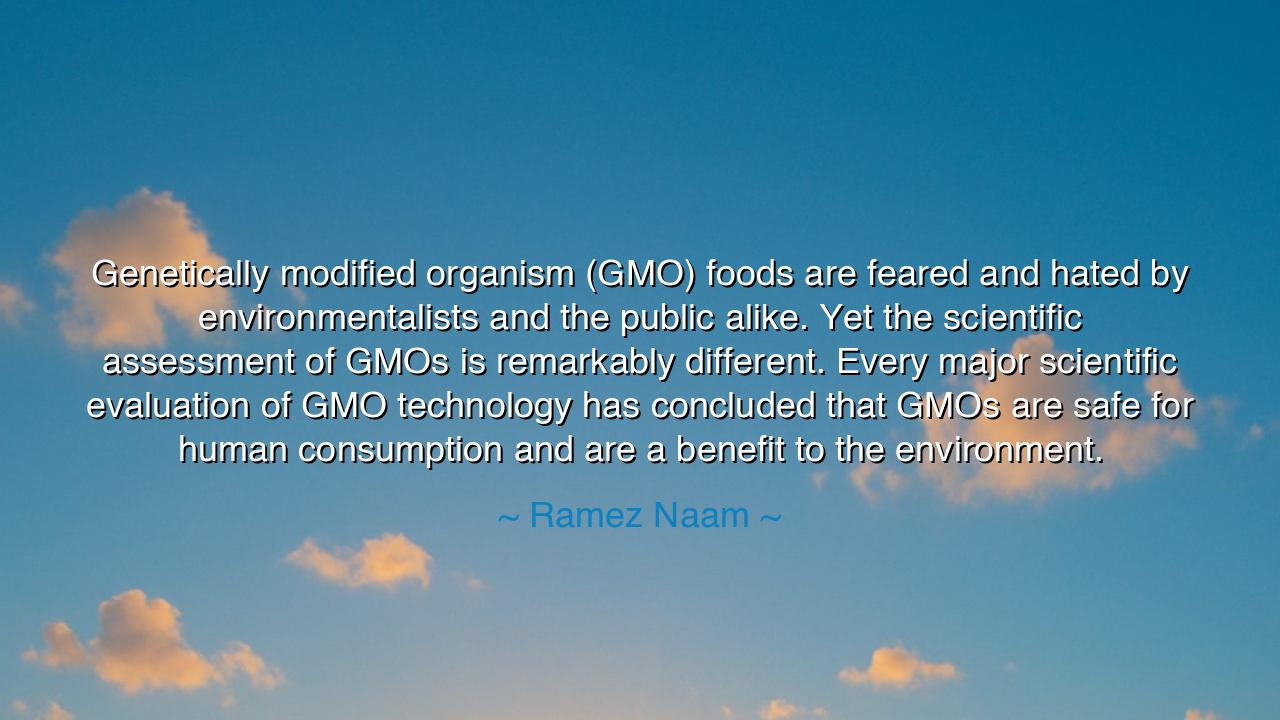
Genetically modified organism (GMO) foods are feared and hated
Genetically modified organism (GMO) foods are feared and hated by environmentalists and the public alike. Yet the scientific assessment of GMOs is remarkably different. Every major scientific evaluation of GMO technology has concluded that GMOs are safe for human consumption and are a benefit to the environment.






Hear the words of Ramez Naam, a thinker of our modern age who stands at the crossroads of science and public perception. He declared: “Genetically modified organism (GMO) foods are feared and hated by environmentalists and the public alike. Yet the scientific assessment of GMOs is remarkably different. Every major scientific evaluation of GMO technology has concluded that GMOs are safe for human consumption and are a benefit to the environment.” In this declaration, Naam reveals a profound tension between fear and knowledge, between the shadow of suspicion and the light of evidence.
The meaning is plain yet weighty: humanity often trembles before what it does not fully understand. GMOs are not monsters born of darkness, but seeds altered with precision, crafted to endure drought, to resist pests, to yield more food for the hungry. Yet the public, haunted by images of tampering with nature, has often met them with fear and hatred. Naam reminds us that the eye of science, after long and careful examination, has seen no poison, no hidden curse, but rather the potential for blessing. Here lies the eternal struggle—our hearts leap to suspicion, even as our minds find reassurance.
History has shown us this struggle before. When the first vaccines were introduced by Edward Jenner, many feared them as unnatural and dangerous. Some mocked, others resisted, claiming that such interference would bring ruin. Yet over time, the scientific assessment prevailed, and millions of lives were saved from smallpox and countless plagues. The tale of GMOs mirrors this path: what begins as dread in the public eye may, in truth, be the very thing that shields the vulnerable and sustains the weary.
Consider too the tale of Norman Borlaug, father of the Green Revolution. By cultivating high-yield and disease-resistant crops, he averted famine in lands where millions might have perished. His work, though less controversial in its time, was in essence the forerunner of genetic modification—a reshaping of plants to serve humanity. For this labor, he was awarded the Nobel Peace Prize, for he proved that when science and compassion unite, technology becomes a vessel of mercy. So it may be with GMOs, if only humanity can temper fear with reason.
Naam’s wisdom arises from this ancient truth: knowledge and fear are eternal rivals. The masses may resist what is new, not from malice, but from uncertainty. Yet the role of the wise is to shine the light of understanding, to reveal that patience, testing, and evidence can separate truth from illusion. GMO technology, studied across decades and continents, has again and again shown safety and promise. To deny this is to close the eyes to both evidence and possibility.
The lesson, O seeker, is clear: do not let fear alone be your guide. Respect caution, but also respect the voice of science, which labors long to uncover truth. When faced with new tools, ask not only, “What do I fear?” but also, “What does the evidence reveal?” Let your heart be wise enough to balance caution with openness, doubt with trust in knowledge earned.
Take practical steps: seek to understand before you condemn. Listen to those who labor in science, and weigh their counsel carefully. Do not fall prey to whispers of fear alone, nor to blind acceptance, but walk the middle path of informed discernment. Support technologies that are tested, proven, and guided by compassion for humanity and the earth.
Thus remember: GMO foods are not demons nor saviors in themselves, but tools. In the hands of wisdom, they may feed the hungry and protect the land. In the hands of ignorance or greed, they may yet do harm. The responsibility is ours—to guide technology with both knowledge and conscience. Let us not be ruled by fear, but by truth, so that the fruits of tomorrow may nourish all who hunger.






AAdministratorAdministrator
Welcome, honored guests. Please leave a comment, we will respond soon